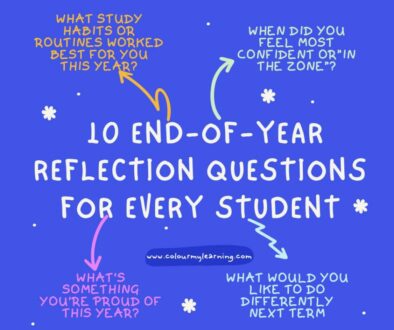Why Exams Matter—But Don’t Define You – A message for every GCSE and A-level student
As exams draw near, it’s easy to feel the weight of expectation. It can seem as though everything depends on a few papers, a few hours, a few numbers at the end. That pressure can sit quietly or feel loud. You might feel anxious. You might feel ready. You might feel tired before you’ve even begun.
These feelings are valid. It means you care and that this matters to you.
Exams are a meaningful opportunity—to show what you’ve learned, to practise focus and determination, to meet a challenge with your full attention. Preparing well, revising with care, and doing your best are all part of the process, and they are worth taking seriously.
But it’s just as important to remember this: exams are not the only way your value can be seen.

You Are More Than a Grade
An exam measures how well you respond to a question on a particular day. It can reflect your preparation and understanding—but it cannot capture your creativity, your empathy, your growth, or the quiet resilience it takes to keep going.
It doesn’t see the late nights, the hard choices, or the courage it takes to try again.
- You are not your target grade.
- You are not the number on your results sheet.
- You are a person—learning, changing, becoming. No exam will ever measure all that you are.
The Effort Still Matters
Giving your best effort is not about being perfect. It’s about showing up for yourself. It’s about committing to the process, even when it’s difficult, even when the outcome feels uncertain.
When you revise with purpose and sit down to try—honestly, fully—you are developing qualities that last long after the exams are over. You’re building focus. You’re building discipline. You’re learning how to navigate something hard and hold your ground.
That learning stays with you. It becomes part of who you are.
Success Comes in Many Forms
Not everyone takes the same path through school, and not everyone finds exams to be the place where their strengths shine brightest. Academic results can open doors—but they are not the only path forward.
Some people build success through curiosity, determination, and the courage to pursue their interests in ways that don’t always follow a straight line.
Richard Branson, who left school early due to dyslexia, went on to shape a global business through his energy and bold thinking.
Maya Angelou, without a formal degree, became a voice of wisdom, justice, and strength for generations.
Steve Jobs, a college dropout, created technology that changed how we live and communicate.
These stories are reminders that success is broad. It can be built from resilience, creativity, and a willingness to keep going. You don’t have to fit a single model to do something meaningful with your life. Your story is still unfolding—and it will include achievements that no exam can predict.
Taking Care of Yourself Through the Pressure
Exams ask a lot of you—not only in knowledge, but in energy, focus, and emotional resilience. Feeling pressure during this time is completely normal. It means you care. But caring for your studies also means caring for yourself.
Build a revision routine that includes regular pauses, quiet moments, and rest. Breaks are not a distraction from learning—they are part of it. Sleep gives your memory the chance to settle and your thoughts the space to breathe. Eating balanced meals and drinking water supports your concentration in ways you might not realise until your body reminds you.
When stress begins to rise, even small acts of calm can help: a deep breath at your desk, a short walk in the fresh air, writing a thought down before it grows too loud. These aren’t just coping strategies—they’re tools for sustaining your focus, your confidence, and your sense of control.
If you ever find the pressure building beyond what feels manageable, speak to someone. A teacher, a parent, a friend. You do not have to face it all alone.
We’ve gathered a collection of gentle, practical strategies in our guide to managing stress during exams. You are invited to explore them whenever you need a quiet moment of support.
A Message for Every Student
Every student brings something different to this season. However you’re approaching your exams, this message is for you.
To the students striving for top grades:
You have high expectations of yourself. You care deeply, and you want to do well—not just for the result, but for the sense of achievement that comes with it. That drive is something to be proud of. But remember, your value isn’t defined by the score at the end of the paper. You are still the same thoughtful, capable person on the days when you feel unsure or tired. You deserve rest as much as you deserve success.
To the students who find exams difficult:
You may have been told you’re “not academic,” or you may carry doubts that don’t belong to you. But the ability to sit with challenge, to keep trying, to ask for help when things feel overwhelming—these are strengths that exams can’t fully measure. You are learning in ways that matter, and those efforts are meaningful, even if they feel slow.
To the students who work quietly and without fanfare:
Your consistency might go unnoticed. You may not always be the one called out in class or praised in reports. But the quiet determination to show up, to try again, to do your best day after day—it counts. The effort you’ve made matters, whether or not it’s ever been celebrated. Keep going. You are building something strong.
And to every student who feels uncertain right now:
You are allowed to move at your own pace. You are allowed to hope, to struggle, to care, to get tired, to begin again. The way you meet this moment is yours—and whatever it looks like, you are still becoming.
A Moment to Reflect Before You Begin
On the morning of your exam, before you open your books or scan your notes, take five quiet minutes just for yourself.
Sit with a pen and paper—nothing complicated—and ask:
- What am I proud of this year that won’t appear on a results slip?
- What have I discovered about myself as a learner, a friend, a person?
Let your thoughts come honestly. There’s no right answer. It might be the courage to speak up in class, the patience you’ve shown when things were hard, the way you helped someone else feel more confident. These are real achievements. Write them down, fold them into your pocket, keep them close.
This short pause doesn’t change what happens in the exam—but it reminds you of who you are before it begins. It anchors you in your own growth, your own story, and the quiet knowledge that there is more to you than any grade.
Later, when the papers are done and the pressure has passed, you’ll return to those words with a fuller sense of how far you’ve come.

Do Your Best, Then Let Go
As you step into your exam, bring your focus with you. Let your preparation carry you, and let your effort speak for itself. Trust what you know. Trust the work you’ve done, even if some of it was quiet or messy or late at night.
Give it your full attention—but not your full identity. Rest when you can. Ask for help if the pressure feels too heavy. And when the paper is over, let it go.
You are allowed to feel proud of your effort, even if the grade doesn’t reflect every part of it. The courage to try, to keep going, to show up—that is also an achievement.
Exams are a moment. They are not a definition. Your life continues far beyond this week, this subject, this result. There will always be more ways to learn, more chances to grow, and more space to define what success means to you.
What matters most is not whether exam day went perfectly—but whether you know that your best, given honestly, is always enough.
















